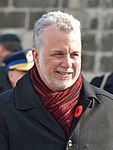Quebec general election, 2014
|
|
|||||||||||||||||||||||||||||||||||||||||||||||||||||||||||||||||||||||||||||||||||
|---|---|---|---|---|---|---|---|---|---|---|---|---|---|---|---|---|---|---|---|---|---|---|---|---|---|---|---|---|---|---|---|---|---|---|---|---|---|---|---|---|---|---|---|---|---|---|---|---|---|---|---|---|---|---|---|---|---|---|---|---|---|---|---|---|---|---|---|---|---|---|---|---|---|---|---|---|---|---|---|---|---|---|---|
|
|||||||||||||||||||||||||||||||||||||||||||||||||||||||||||||||||||||||||||||||||||
|
|
|||||||||||||||||||||||||||||||||||||||||||||||||||||||||||||||||||||||||||||||||||
|
in the National Assembly of Quebec 63 seats needed for a majority |
|||||||||||||||||||||||||||||||||||||||||||||||||||||||||||||||||||||||||||||||||||
| Opinion polls | |||||||||||||||||||||||||||||||||||||||||||||||||||||||||||||||||||||||||||||||||||
| Turnout | 71.43% | ||||||||||||||||||||||||||||||||||||||||||||||||||||||||||||||||||||||||||||||||||
|
|||||||||||||||||||||||||||||||||||||||||||||||||||||||||||||||||||||||||||||||||||

Results by riding
|
|||||||||||||||||||||||||||||||||||||||||||||||||||||||||||||||||||||||||||||||||||
|
|||||||||||||||||||||||||||||||||||||||||||||||||||||||||||||||||||||||||||||||||||
The 41st Quebec general election was held on April 7, 2014 to elect members to the National Assembly of Quebec.
The Quebec Liberal Party under Philippe Couillard won a majority government of 70 seats, while the incumbent Parti Québécois finished second with 30 seats, becoming the first single-term government since Jean-Jacques Bertrand's Union Nationale government was defeated in 1970. It marked the lowest seat total for the Parti Québécois since 1989 and its smallest share of the popular vote since its inaugural run in 1970, as Premier Pauline Marois lost her own riding. The Coalition Avenir Québec under François Legault made minor gains in terms of seats despite receiving a smaller share of the popular vote than in the previous election. Québec solidaire won an additional seat, though co-spokesperson Andrés Fontecilla failed to win his riding.
At the outset of the campaign, the Parti Québécois had a modest lead in the polls and appeared to have a realistic prospect of winning a majority government. However, the party's support began to collapse rapidly after the party announced Pierre Karl Péladeau, the president and CEO of media conglomerate Quebecor, as a star candidate. Péladeau's conservative and anti-union business background was widely criticized as being at odds with the party's social democratic history; and his outspoken support for a third referendum on Quebec sovereignty quickly sidelined the issues — including the Charter of Quebec Values and the corruption allegations against the Liberals, the latter of which had contributed to the defeat of Jean Charest's government in the 2012 election — which the party had identified as its primary campaign themes, alienating many voters who had little desire to revive the sovereignty issue.
...
Wikipedia




